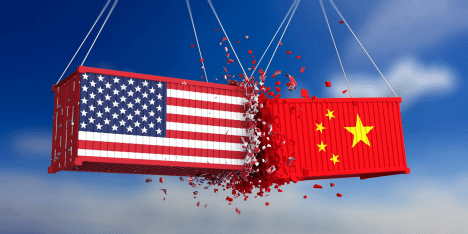
War is bad for business and poses potentially catastrophic risk to supply chains, a customer base, and creates inflationary pressures detrimental to a balance sheet. Companies, particularly in the US, have little understanding of war and the impact it can have on the viability of their business. Geopolitical risk intelligence can offer warnings of risk before they occur and allow executives critical time to insulate themselves from loss. However, wishful thinking regarding war does nothing to safeguard a company facing the risk of geopolitical conflict. American companies doing business in People’s Republic of China (PRC), where the risk of war is increasing, have learned nothing from the losses booked by Western companies recently operating in Russia.
Driven by an increase in Chinese consumer savings, where savings deposits increased by $2.6 trillion in 2022 according to the People’s Bank of China, an array of US companies are expanding their presence in the PRC. Companies ranging from the technology sector to fast food, and fashion are betting on China in the long term. Howard Schultz, CEO of Starbucks, outlined corporate America’s optimism when he stated that he is “more confident than ever that we are still only in the early stages of our growth story in China.” In September 2022, the coffee giant laid out a strategy for opening an additional 3,000 stores in the Chinese mainland by 2025. Many American companies are not only seemingly disregarding the geopolitical risks involved in their China plans but illustrate the same lack of intelligence that recently cost Western companies in Russia after its invasion of Ukraine.
Western business schools, and American corporate culture are the recipients of ideas from neoclassical economics (NCE). This view harbors an assumption of separation between the business world and geopolitical arena. NCE views a world of efficiency and profit maximization, where transactions between parties result in mutual benefit. In contrast, the political world is driven by actors pursuing power. For great powers, such as Russia, China, and the United States, the mutual benefit and transaction-based culture of the business world is of little concern. Companies recently learned this lesson in Russia.
Russia first formally invaded Ukraine in 2014, when it began annexing Crimea. Eight years of forewarning provided Western companies ample time to offload risky holdings in the Russian Federation and reorient supply chains away from the battlefield. Yet, Western companies ignored the geopolitics at a peril totaling at least $240 billion between February and October 2022. Approximately $90 billion was lost on the very “first” day of the main Russian invasion in February 2022. Shortly after the first Russian tanks entered Luhansk, over 1000 companies quickly, and voluntarily, fled Russia.
Despite the post-Cold War euphoria and biases that still permeates much of the thinking about globalization, market integration does not necessarily lead to peace. Market penetration and integration equates to exposure, not automatic mutual interest. Liberal peace theory, which stipulates that bilateral independence diminishes incentives for conflict, fails repeatedly. Economic interdependence predominated in European states prior to the First World War but did nothing to prevent it. Economic integration is inherent within countries, but similarly does not forestall civil war.
Russian energy use in Europe should have curtailed the war with Ukraine, which has since spiraled into a proxy war with the West. Prior to the Russian invasion in 2022, not 2014, half of Europe’s energy supplies originated in Russia. European banks have been reluctant to leave Russia, despite banks inherently disliking conflict and often advocating against it. Integration did not maintain peace but did exacerbate the economic pain of war. For US companies investing in China, the long-term consequences of increasing exposure all lead to loss, but risks loss in different ways.
Geopolitical tensions between the US and China are increasing. The recent spy balloon debacle, in which the Chinese surveillance device was allowed to traverse the entirety of North America before being shot down over the Atlantic Ocean, is only one indicator of geopolitical risk involving war with China. China has made mass surveillance of Americans and US industries a pillar of its geopolitical strategy to supplant the US as the premier power and rule maker in the international system. China alone steals up to $600 billion annually from American businesses through IP theft. For American companies expanding in China, the costs are potentially even higher when time horizons are expanded.
Should conflict break out into a hot war involving the US and China, US companies in the PRC will face three unappealing options that will damage their business. If US companies are forced to hastily retreat from China as they did in Russia, their losses could be greater. China may seize assets outright, while some companies will be forced to sell assets at a loss. Reorienting supply chains and suppliers outside of China will then prove more costly, as multiple companies seek to de-risk from the conflict and vie for alternatives. As companies scramble to find alternative suppliers in Asia, they may be exposed the conflict as it expands. Latin American economies will enjoy a privileged position of charging a premium to the corporate refugees from China. Companies investing in Chinese expansion today, are investing in loss tomorrow so long as the geopolitical status quo remains. Longer term, US companies face a darker choice.
American companies in particular are the product of an economic liberal order predicated upon private property rights, competition, and relatively open trade. Such businesses are the product of an order antithetical to the statism predominant in China. Should Chinese statism become the global economic norm, whether as the result of the US losing a war with China or by simply supplanting the American system, US companies will ultimately bear little resemblance to their present selves. Regardless, the loss looms for companies expanding in China.
De-risking is always an option, but companies require geopolitical risk intelligence and “deep dive” due diligence investigations in order to do it.
Executives and their legal counsels need the granular data that only boots on the ground intelligence can provide. Companies need unbiased and triangulated intelligence to maneuver in a world unseen by economics and executives correctly concerned with their business operations. New partners and markets need screening. Companies must look before they move. For US companies blindly expanding into China, de-risking offers a path out of the Faustian relationship currently unfolding.
US Companies operating in China may not be prepared for the outbreak of War and should learn from the mistakes made in doing business in Russia before the war broke out. In summary US Companies should establish a geopolitical risk management model tailored specifically to their business operations, business risk tolerances and ability to deal with potential conflict and serious reputation damage.



